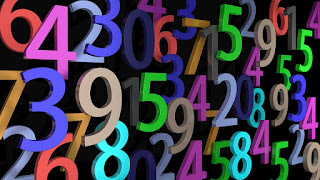Numbers in mathematics
Number system in math
· Natural number:- The numbers which start from 1 and goes upto to ∞ are called natural numbers.It represented by N.
N = 1, 2, 3, 4, 5, …………………∞
· Whole numbers:- The numbers which start from zero(0)
and goes up to ∞. It is represented by W(capital W).
W= 0, 1, 2, 3, 4,
……………∞
· Integers:- All the number between -∞ and ∞.It is represented by Z.
Z= -∞……….. -2, -1, 0, 1,
2,……………..∞.
Two type of integers are
A. Positive Integers:- 1, 2, 3, 4,……………∞.
B. Negative Integers:- -1, -2, -3,…………… -∞.
· Even Numbers:- The numbers which are divisible by 2 or multiple of 2. i.e. 2, 4, 6, 8,……………….∞.
· Odd Numbers:- The numbers which are not
divisible by 2 or not multiple of 2. i. e. 1, 3, 5,…………………∞.
· Prime Numbers :- Natural numbers which are
divisible by itself and unity
. i. e. 2, 3, 5, 7, 11,………..
The 15 prime numbers between 1
to 50.
The 10 prime numbers between 51
to 100.
The 25 prime numbers between 1
to 100.
Only 2 is least prime number and also only 2 is even prime number.
· Composite Numbers:-
The numbers which other divisors besides 1 and itself i.e. 4, 6, 8, 9
etc.
·
1 is neither prime nor composite.
· Rational numbers:- The numbers which written in form
p/q where q≠0, and p,q are the integers. i.e. ¾, 4/5, 1/3, etc.
Every rational number can expressed
in decimal form. There are infinitely many rational numbers between two
rational numbers.
· Irrational Numbers:- The numbers which cannot written
in form of p/q . i.e. √2, √5,  etc.
etc.
 |
| Number system in math Irrational numbers |
π is an irrational number yet its values appears
in rational numbers (π = 3.14). Because these are it approximate
values.
· difference of the rational number and
irrational number is always irrational number.
Sum and difference of rational number and irrational number is always irrational number.
Sum and difference of rational number and irrational number is always irrational number.











0 comments:
Post a Comment